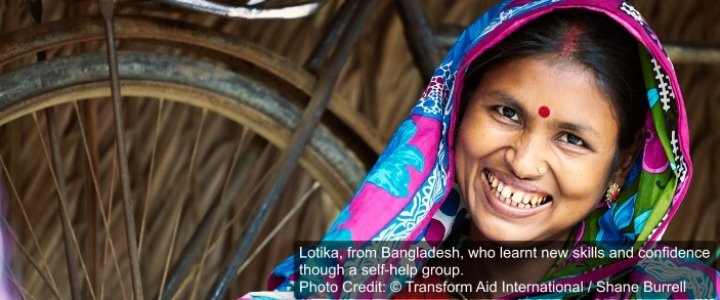Marketing Manager at Transform Aid International, Greg Wood, shares with us how they approach important ethical issues that arise when representing the lives of others. He describes how Quality Principle 6 of ACFID’s Code of Conduct is applied in practice and why those working in communications are an essential part of the development process.
What does Quality Principle 6 (Communications) mean to you?
Transform Aid International is committed to communicating truthfully and ethically. Practically speaking, this has two dimensions – it is about respecting the people we’re communicating with, but also about respecting the people whose stories we share. The requirements set out in QP 6 of the ACFID Code of Conduct, help us to ensure we’re treating both of these groups with the respect they deserve.
Our supporters are faithful, loyal and generous. Our supporters give out of their genuine love for those who lack the resources to escape poverty. But, they choose to give to us because they trust what we say and do. We love and respect our supporters, so we tell them truth. We also know how important integrity is for retaining their trust.
But the other dimension is just as important. Our communications team is not merely the “other side” of the development coin. We are not just fundraisers, who raise money for development projects. We are, in fact, a part of the development process. Every time we plan a trip to meet a beneficiary from a community in our working area, we want to be sure that the people we meet are recognised as more than a title (“beneficiary”). They are real people, with real strengths, and real stories and experiences that they are eager to share. When we show them that respect, we contribute to the change we long to see.
As communicators, representing the lives and experiences of other people puts us in a privileged and powerful position. Can you share with us some of the ways you try to negotiate this in the field?
We must acknowledge that an innate power imbalance exists between us and the communities with which we partner. While (arguably) it’s impossible to completely neutralise this imbalance, Transform Aid International’s approach to community development is strengths-based and collaborative. As story-collectors, we could undo so much of that work towards empowering individuals with our first step into a community, were we to bring a large camera rig and ask pushy, entitled questions. That’s why a lot of work goes on ahead of time, working with our local partners so we can not only be respectful of cultural differences, but also ensure that the people we will meet are fully aware of what our visit might entail. Additionally, we seek to minimise our impact by sending a small team who understand the importance of listening and endeavour to make their camera rig as unobtrusive as possible. And we always defer to the advice of our local partners when necessary.
What about when you’re in Australia, editing and preparing your public materials?
When considering the ethics of editing, our starting point is the truth – representing what our hero tells us and intends us to share – but, sometimes we need to be more intentional about how we tell our hero’s story. That is, we choose how to share their story.
For instance, if we judge a photo to be undignifying, then it won’t be published – even if it is truthful – because we are committed to presenting all people with dignity. Or, our hero might say something about how they see themselves or their struggle that, we believe, could convey a negative message like, “I beg for food”. We wouldn’t include it, because it might reinforce the old positioning of our readers as saviours, in that they see a person who has no power or agency of their own. Or, we might hear our hero express a result of our work that we know we can’t claim, such as a medical outcome that isn’t clinically proven or universally true – we wouldn’t repeat this either.
We are dedicated to ensuring that the narrative we share equalises, respects, and recognises an individual’s humanity and agency. We edit (of course) because we can’t tell whole life stories, nor do we always have the space to paint the broader context of a country’s history, or the complexities of governments and economies. But we intentionally choose elements of stories to quickly set the context and present a representative and powerful picture.
What processes do you have in place to help you decide which images and stories to use?
In 2016 we created a Communications Compliance Checklist. We use this checklist to help project leaders cross-check each important element of the ACFID Code of Conduct and our own policies. We also have an approval process that involves a variety of personnel, and we meet to discuss specific cases and how we’re tracking more broadly. It’s helpful knowing that, even though we have different skills and responsibilities, the Fundraising, Marketing and Programs teams are all working towards the same goal.
Informed consent is an important part of Code requirements. Can you tell us bit more about how this works in your organisation?
Within communities, when we or our local partners collect stories and photos, we follow our Informed Consent Policy. This comes with a practical procedure, forms for easy record-keeping, and a conversation guide. We have also developed a visual aid to use as part of our informed consent conversations – a laminated binder of recent collateral, to help people better imagine themselves in these communications and, thus, more knowingly decide if they want to take part.
We only collect a story for use when an individual gives their consent, and we take time and effort to ensure they fully understand to what they’re consenting. While record-keeping is important, for us, the most salient part of the process is a clear explanation of our intentions, so an individual can knowingly and freely say, “No thank you”, should that be what they wish. In this way, we ensure that we always value a person’s dignity and right to choose how their story is shared.
Do you always get written consent?
As an organisation, we also prioritise verbal consent. As we developed the policy with our International Programs team, we discussed that one weakness of the typical consent interaction is that it often predicates written consent, with its legalese and signatures. This may be normal and expected in our context, but it’s by no means a regular part of life for the communities we work with.
We prefer to build a connection with the people we interview by explaining why we want to collect their story, how it will be used, and the possible ramifications of sharing their story before seeking their verbal consent. We take our time in having this conversation and answer any questions they might have. In this way, to the best of our knowledge, the consent that we receive is truly informed and freely given. Then, for our organisational records, we complete a verbal informed consent statutory declaration, to declare that a conversation has occurred and that informed consent of the individual has been freely given.
I should note, that it is just as important to us that we adhere to this process when interviewing supporters in Australia, as it is in the field. We are confident that we will continue to evolve and improve our procedures as we learn more from the communities we work with and our peers, alike.

Emily Moreton
Greg Wood is the Marketing Manager at Transform Aid International, overseeing the Baptist World Aid Australia brand. Greg is responsible for communications strategy, digital, and content marketing, working with the Supporter Development and Advocacy teams to have an impact for, and through, supporters. Greg has worked for Transform Aid International for four years and has a background in Marketing, Advertising and Fundraising. Greg has a Masters of International and Community Development and a Bachelor of Business, Marketing.









